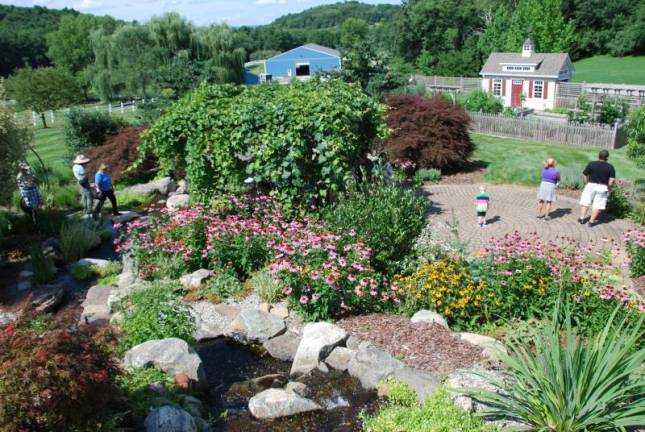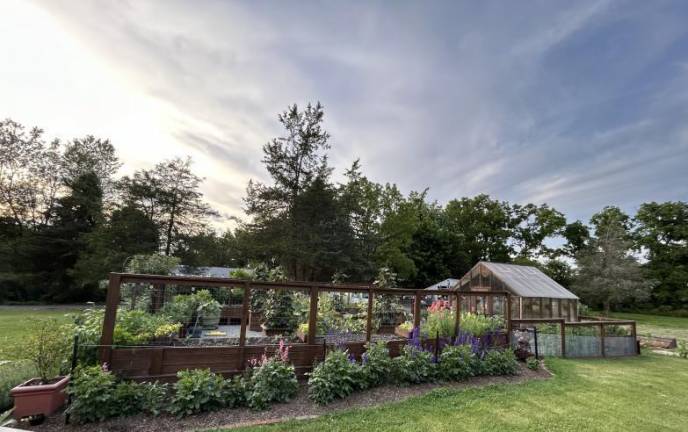Kitchen Garden Tour is today
REGION. This is the 10th year of the tour, with more than a dozen gardens, including some past favorites.


Local backyard food growers will open up their garden gates for Dirt magazine’s Kitchen Garden Tour on Sunday, July 28.
This is the 10th year of the tour, with more than a dozen gardens, including some past favorites.
Tickets may be purchased online at kitchengardentours.com
Equipped with a map and descriptions of each garden, ticketholders embark on a self-guided tour at 10 a.m., hopping from one local veggie patch to the next.
At each plot, they explore the gardens and meet the green-thumbed owners to learn new tips.
Select ticketholders join the gardeners at Meadow Blues from 5 to 7 p.m. Everyone votes for their favorite gardens at the end of the day, and winners are announced at the event.
Fig trees and flowers
Dawn Mele’s garden in Vernon tied for first place in 2022.
When she was growing up, her mother always had a big garden in the family’s backyard.
“I always grew up with something to pick or something to grow,” she said.
Today, Mele and her husband live in the same house where she grew up; they purchased it 25 years ago. The house looks a little different now, but the nourishing soil persists.
Mele’s current garden was a post-COVID project. She started out by just growing vegetables, to which she soon added cut flowers.
She grows her sprawling garden from seed, always introducing new plants and projects.
Her favorite time-saving gadget in her garden is drip-irrigation, which is easy and convenient and also saves water.
Mele’s garden is predominately made up of raised beds, built by her husband, a carpenter. But she also has a greenhouse for special projects, such as citrus trees, olive trees, her orchid collection and cacti.
“I don’t plant the same thing twice,” she said. “It teaches me something new every day. It teaches me patience.”
Her garden is one of her favorite places to be, and she’s excited to welcome like-minded gardeners there to commiserate over garden defeats and share the joy of “little victories.”
A ‘food forest’
Kitchen Garden Tour alums April and Rocco Perciballi of Lafayette are thrilled to be showing their garden again this year.
April grew up in her mom’s garden; she didn’t have much interest in the veggie patch as a child, but as she grew up, she “remembered how good the vegetables were” and decided to start her garden in 1999.
“We originally just dug up some dirt and planted some tomatoes,” she said.
The tomatoes thrived in their first year, and April went to bed excited to harvest them in the morning. When she woke up, “the tyrannosaurus deer” had eaten every one.
The next season, the Perciballis added a fence to their plot. Now, they have what April calls “a permanent garden” at their home. She grows peas, eggplants, garlic, asparagus, zucchini, sweet potatoes and tomato varieties, her favorite being the sun golds.
Rocco has his own vegetable garden “to grow all the stuff I won’t grow,” April said. He continues to add new experimental plants to the garden.
Nut trees, figs and honeyberries are some of the plants that are just beginning to fruit in Rocco’s “food forest.”
The Perciballis are vegan and eat or can much of their food directly from the garden. They have three children and six grandchildren, who like to help them take care of any surplus berries.
In addition to experimental plants, the Perciballis added new amendments to their soil; additional calcium and natural fertilizers have helped their garden thrive this season.
“You have to nurture the soil,” April said. She also tried mixing up her raised beds, growing different vegetables together, which has made for a successful season thus far. These trials are “a chance to reduce the amount of work and increase the harvest.”
Farmer-led gardening
Fourth-generation farmer Chris Pawelski will be showing his garden in Goshen, N.Y., this year.
Living in the historic Black Dirt Region, Pawelski plots “a lot of offbeat stuff that’s you’re not going to find anywhere else.”
“I was a conventional onion farmer until COVID,” he explained. The pandemic disrupted traditional farming markets, and in response, he and his wife, Eve, pivoted from growing onions to cultivating niche crops, such as purple string beans and white peppers.
The Pawelskis run the farm independently; they gave parcels of land to former farm workers to grow their own food.
“I have the space, so I’m not looking to charge them,” he said. “If they want anything they pick, they take it home.”
The lifetime farmer has an arsenal of unique tips and tricks to keep pests at bay, such as spraying his crops with purple Kool-Aid to deter birds and small animals. His cats, Oreo and Squatty, also take care of intruders.